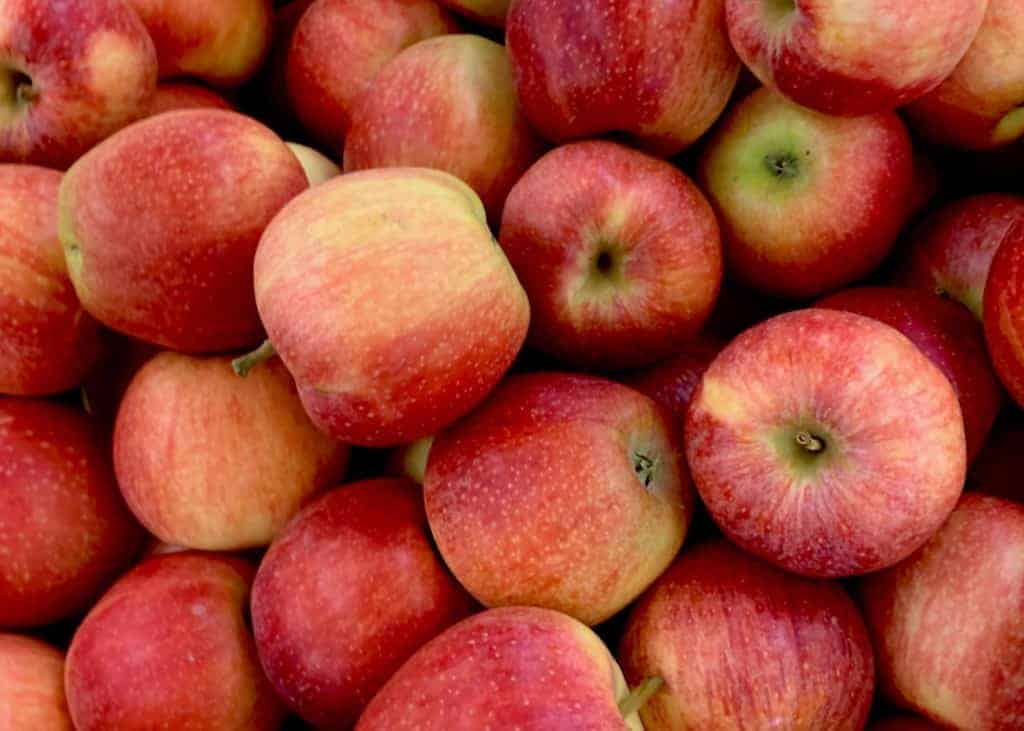Food of the Month – Apples

Click here for a delicious Apple Fennel Salad recipe.
According to genetic studies, the modern apple is descended from small, green, astringent wild apples in Kazakhstan.
Apple trees are propagated through grafting branches onto preferred rootstock rather than by planting a favorite apple seed directly in the ground. Look at an apple tree trunk and you will see the graft scar.
Fleshy fruits like apples evolved to attract large animals to consume them, digesting the fruit and dispersing seed via their scat. Apples and other large fruits attract larger animals such as humans, wild horses, deer and ancient megafauna.
FYI: Washington State University is responsible for the creation of the Cosmic Crisp apple introduced to market in 2019.
Nutrition: One large apple provides 20% of dietary fiber, 8% Vitamin C, and only 130 calories, however, it also contains 34 grams of carbohydrates and 25 grams of sugar. Sugar from fruit, called fructose, is preferred over “added sugar”. Aim for 2 cups of fruit per day.
2/3 of the antioxidants in an apple are found in its peel.
There are over 7,000 varieties of apple produced globally, though most supermarkets carry only seven.
To lighten up a baked recipe, substitute unsweetened apple sauce for half of oil.
Fun Facts: Crabapples are the only apple native to North America.
Washington state grows 58% of apples grown in the US; all are picked by hand.
Storage Tips: Apples ripen 10x faster at room temperature vs refrigerated. To store cut apples, toss in citric acid or dilute lemon juice to stop enzymatic browning which is a reaction that turns apples brown and mushy once exposed to oxygen.
Choose apples which are shiny and firm with no bruising.
Fun Facts: Granny Smith apples were cultivated in Australia by grandmother Maria Ann Smith.
According to the New England Historical Society, Johnny Apple-seed was a real person named John Chapman who was born in Massachusetts in 1774. Chapman travelled west ahead of settlers, creating apple tree nurseries where he would sell saplings to newly arrived farmers for the production of hard cider.
 Amber Phillips, MS, RD is a registered dietitian at Island Hospital. She has a Master’s degree in nutrition from Bastyr University in Kenmore, WA and a Bachelor’s degree in biology from Metropolitan State University, St. Paul, MN. Phillips has a keen interest in community education. “Nutrition advice can be confusing and sometimes conflicting,” says Phillips. “My role as a dietitian is to follow the latest research and make it easy to understand for my patients and the public.” To schedule an appointment with Phillips, call (360) 299-1300 x2567.
Amber Phillips, MS, RD is a registered dietitian at Island Hospital. She has a Master’s degree in nutrition from Bastyr University in Kenmore, WA and a Bachelor’s degree in biology from Metropolitan State University, St. Paul, MN. Phillips has a keen interest in community education. “Nutrition advice can be confusing and sometimes conflicting,” says Phillips. “My role as a dietitian is to follow the latest research and make it easy to understand for my patients and the public.” To schedule an appointment with Phillips, call (360) 299-1300 x2567.
Published on September 11, 2020
